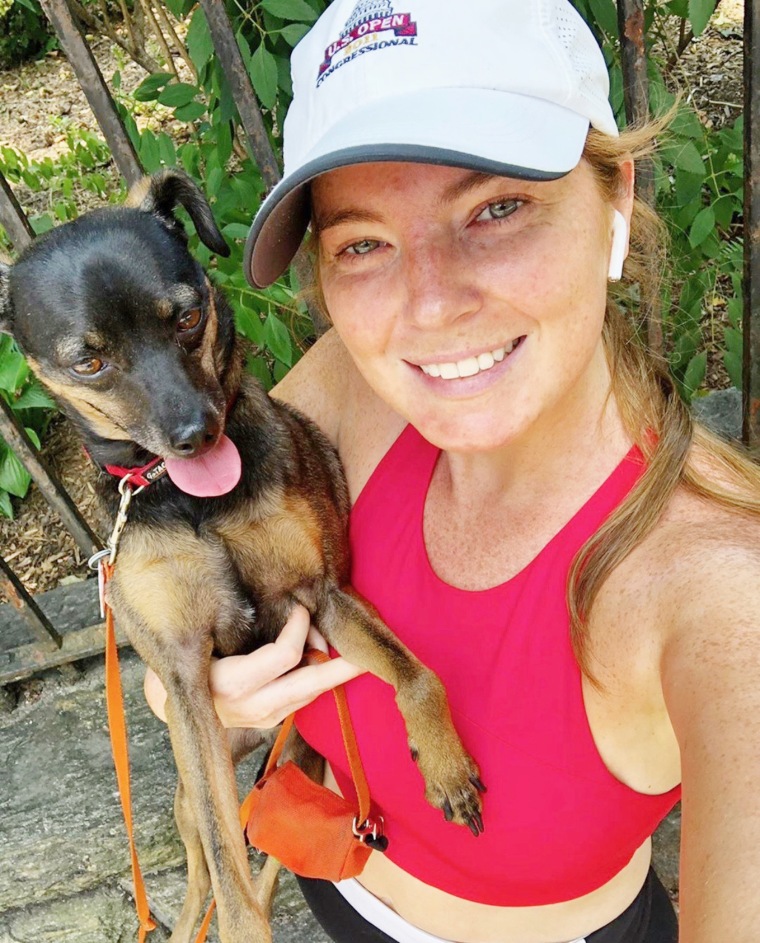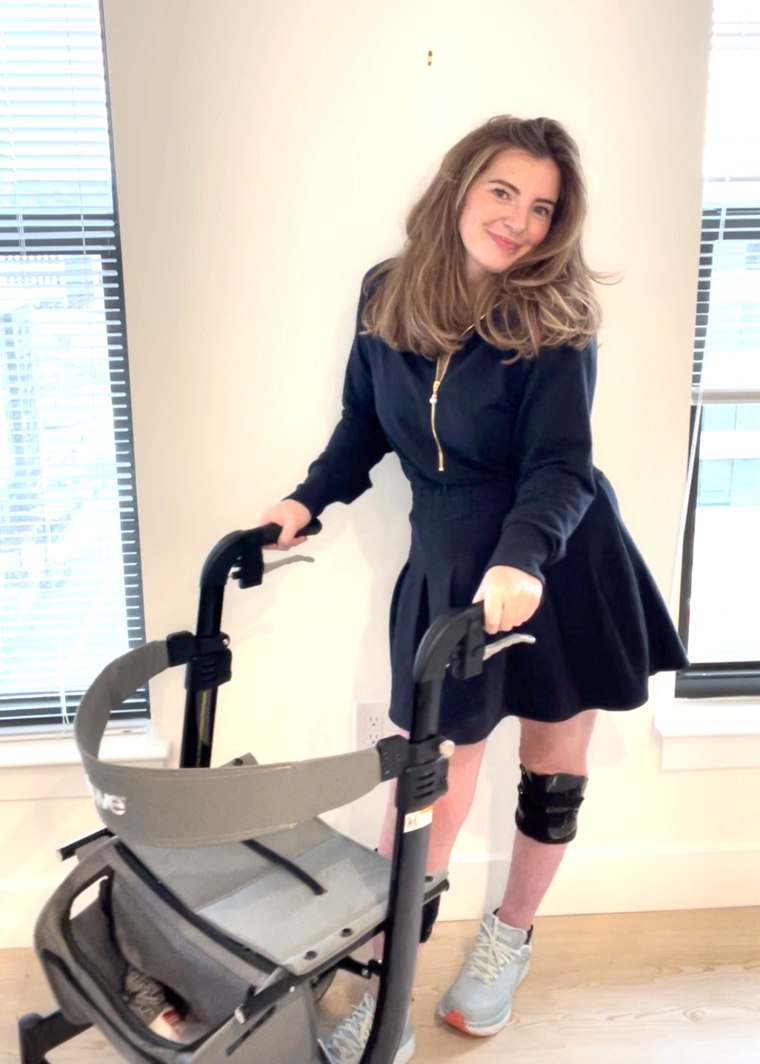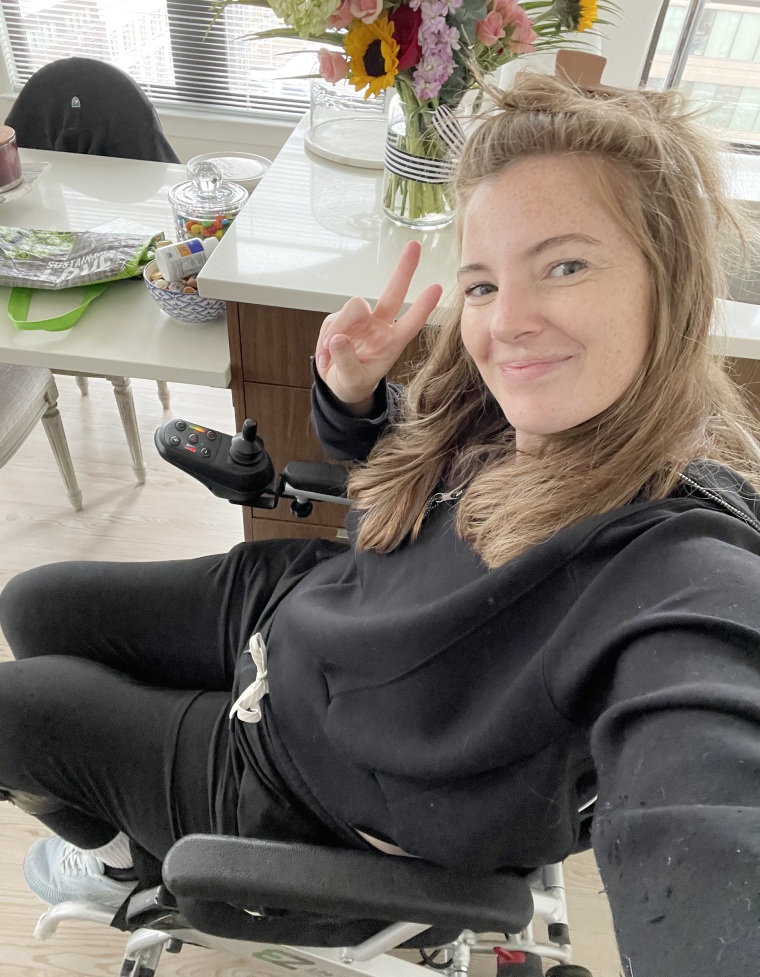My life isn’t going to be what I always dreamed about, but I believe I was meant to have Lou Gehrig’s disease, or ALS.
When people think of ALS, the degenerative nervous system disease that impacts nerve cells in the brain, they may associate it with older celebrities like Stephen Hawking or Lou Gehrig himself.
Most people don’t connect a terminal disease that weakens muscles to a healthy 34-year-old woman. I didn’t when my symptoms began, and part of me thinks that a lot of the stall in getting my diagnosis in the beginning was that doctors almost didn’t want to believe that I had ALS. I imagine that it’s a very hard diagnosis to give, much less to someone who seems fairly healthy.

One day, I was rushing out of my office in New York City to get to a work event five blocks away with colleagues, and I was struggling to walk. It came out of nowhere, but I couldn’t keep up with my co-workers. In the following weeks, it felt like I was limping almost every time I walked somewhere. I thought maybe I’d hurt my back or done too hard of a workout and injured my ankle. I assumed it was something minor. I was only 29.
Soon, other people started noticing the limp in my left leg, too. I decided it was time to see a doctor. I had MRIs, CT scans, X-rays, spinal taps and blood tests done, and one by one, all of the more minor diagnoses were ruled out, but my symptoms remained a mystery to doctors.
In 2020, one doctor suggested ALS as a potential cause for my symptoms, and I remember my entire family was furious at him. They said, “Of course it’s not ALS — that’s mostly for older people,” and “You would have progressed way faster if that’s what this was.” When it comes to ALS, I think people picture a very fast progression where your whole body is paralyzed, and that’s not what mine looked like at the time. We put the thought out of our heads.

Going into my fourth year of having symptoms in my left leg, I still wasn’t diagnosed. When I was 33, I began experiencing weakness in my right foot. I went back to the doctor and, in March 2022, I was officially diagnosed with ALS.
Getting a terminal diagnosis, I felt a mix of shock and sadness. I was depressed during the first couple of months. Someone would ask me how I was doing in a grocery store and I’d just start crying.
My turning point was at a friend’s wedding a few months after my diagnosis. I was part of the wedding party, and I was using a walker. All I could think about was the image of me with my walker, surrounded by other 30-year-olds who needed no assistance to stand up, embarrassed by the hand I’d been dealt. But somehow, by the end of the night, with the help of all my friends rallying around me, we had the bride doing the limbo under my walker and I was giving people rides around the dance floor.
Beyond having a great night, it was a pivotal mental shift for me. It was this moment where I thought, “OK, if we can laugh about this here, then I need to make this into a better situation, because it’s not changing either way.”
I created a TikTok account to help explain to people what I was going through without making it a heavy conversation. The first videos I posted gained more traction than I expected and I started getting really funny comments, and people started following me. Over the last eight months, I’ve found this huge community of people who are interested in learning about my ALS journey, whether I’m taste-testing a disgusting new medication or figuring out dating with a terminal illness.
I’ve found this huge community of people who are interested in learning about my ALS journey, whether I’m taste-testing a disgusting new medication or figuring out dating with a terminal illness.
I try to share what keeps me afloat, because I think it might help educate other people.
The reality is that ALS is not rare. The lifetime risk is about 1 in 300 before age 85, according to one study.
People may remember the Ice Bucket Challenge — I think people paid a lot of attention to that, but I don’t think many people really learned about ALS from it. I think that when people hear of ALS, they still think of old men and not vibrant young people. A whole population is ignored. (Most people with ALS are diagnosed between age 55 and 75, according to the Centers for Disease Control and Prevention, but younger people can also get ALS.) And maybe people also think, “Wow, ALS is the richest disease of all time. They made so much money on the Ice Bucket Challenge.”
But there’s still no cure. Most people live for 2 to 5 years after being diagnosed, according to the CDC.
There are some approved medications that are intended to slow progression by a matter of months, but when you’re only looking at a few years, six months is not super comforting.

When I was first diagnosed and still in shock, I joined a group of young women who were all diagnosed with ALS before age 35. I remember one of the girls in the group said to me, “Look, if you don’t feel comfortable sharing your story, share mine.” To me that was such a powerful thing to say because I knew there was a reason people in the group are sharing their stories. They know that the more awareness we can drive, the better chance we have to survive.
ALS is very much still a hopeless disease. The scary part is that so much is unknown about why people are affected by it, but if any of my videos can help start conversations to drive awareness — and then drive pressure and resources — then maybe we can find a cure, or a way to make this a livable disease.

People come up to me all the time and say, “I can’t believe you’re handling this so well. I could never handle it this way.” Or, “You seem so fine for someone dealing with this.”
I think we’re all more resilient than we realize. Of course I cried and lashed out for the first two or three months. But my brain no longer goes into: What am I going to look like next month? What will next year look like?
If I start even going down that path, my brain somehow reroutes me and gives me some peace, and that’s something I hope to bring to the ALS community.
This interview has been edited and condensed.